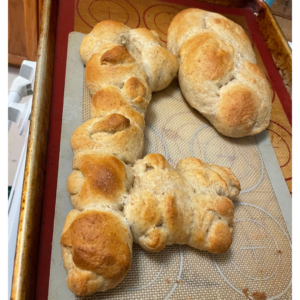Last week was the first Shabbat after Passover, and my child and I tried our hand at a custom we had never observed before – baking schlisl challah, or key challah. I think we didn’t do too badly for a first try.
Growing up in Israel, I had never heard of this Ashkenazic custom before coming to North America. I imagine it was absorbed from the Christian environment, with its cross-shaped Easter bread, and it was frowned on by many rabbis as being superstitious. The idea is that the first challah after Passover should be baked in the shape of a key, or maybe have a picture of a key on it, or even have a key hidden in it. This is supposed to be a segulah, or a charm, for a prosperous year. Magical thinking at its best, or maybe not?
When I was looking for information on how to create this challah shape, I ran across an article in The Forward, by Noam Sienna. The author beautifully explains a different take on the schlisl challah, which really appealed to me.
On Passover we eat only unleavened bread, as a reminder of the suffering of our ancestors in Egypt, and our gratitude for our liberation from slavery. Those same ancestors, however, were an ungrateful lot of former slaves with no initiative or self-esteem, and they were not ready to build a new community of free people. Hence the wandering in the desert for forty years, eating manna from heaven because they didn’t have the gumption to take care of themselves and others properly.
The new generation, however, crossed the Jordan and became farmers, and the manna ceased. It was no longer necessary, because they could take care of themselves. They were still dependent on rain and community spirit, so the pilgrimage holidays were instituted, when they could bring their first fruits to the sanctuary and express their gratitude for their prosperity. At that time they were also reminded of their history as liberated slaves and enjoined to be kind to the stranger, the orphan and other vulnerable people in their communities.
As the pandemic starts to ease around here, I stand on the threshold of yet another child moving out of my house. Any parent will tell you that we view this transition with a mix of excitement and sadness, joy and trepidation. Will they be OK without our manna? Can they become actual adults? We will miss them so much – will they miss us too?
The schlisl challah is a reminder to be grateful for our ability to take care of ourselves and our children, and I would add – our ability to give and accept help from our community as well. To paraphrase Pearl S. Buck, a civilisation is judged by how it treats its most vulnerable members. We would all do well to remember that none of us are immune to the slings and arrows of injurious fortune – let us help others if we are able, and gratefully accept help if we need it. There is no shame in either position.
Do you observe “silly customs” that might have a deeper meaning? I’d love to know!

